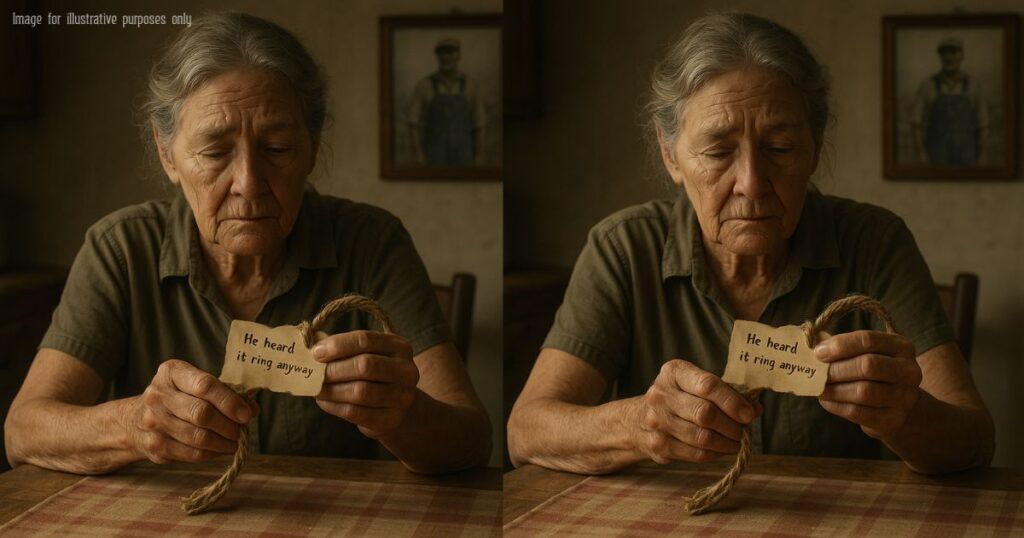I booked a flight that afternoon. The hospital owed me vacation time. I didn’t ask permission. I just handed over my patient list, nodded to the charge nurse, and walked out.
My hands shook on the plane. Not from fear. From something deeper. That old sense of being summoned. Of duty. The bell did that to you. It was never just noise.
When I pulled up the gravel drive, the sun hadn’t fully risen. The porch sagged more than before. The windows were fogged from inside — frost creeping up the corners like veins.
The bell rope swayed gently.
I stepped out of the rental car, boots crunching over ice-crusted grass.
I didn’t yell. Didn’t want to scare whoever it was. I just walked around the house, slow and steady, toward the barn.
The door was open an inch. The scent hit me first — mold, old hay, and something else. Pine? Soap?
Inside, tucked between rotted beams, was a mattress pad, a milk crate, and a flannel blanket. A flashlight. A Bible. A thermos.
And next to it all — a pair of boots far too small for a man.
Her name was Wren.
Seventeen. Hollow-cheeked, soft-spoken, and sharp as a tack.
She said she’d been hitchhiking from Oklahoma. Mother gone. Father in prison. She’d heard from someone — she couldn’t remember who — that there was a place in Nebraska where you could work for food and no one would ask too many questions.
She found the bell by accident. Said she rang it because she thought it might bring someone back.
“I figured,” she said, “if you ring a bell loud enough, somebody’s bound to hear it.”
I should’ve called child services. I knew that.
But I didn’t.
Instead, I brought her soup in a mason jar. Let her use the bathtub. Gave her one of Daddy’s old coats. Watched her walk through the frozen fields like she belonged there.
She asked questions — not the kind teenagers usually ask.
“What’s that tool for?”
“Why do chickens peck each other?”
“Is it true radishes can grow in winter?”
And at dawn, every morning, she’d ring the bell.
Same time Daddy did. Same rhythm.
I stayed a week. I made a phone call to the clinic in town. Asked if they needed part-time help. They did.
I told them I’d work mornings only. Afternoons were for chores.
For Wren.
We patched the coop. Dug out the shed. Hauled kindling. She didn’t complain once.
She didn’t ask for money. Didn’t want a phone. She just wanted something to do with her hands.
Said it was the first time she’d ever had calluses.
One morning, I found her in the garden, crying.
She held a seed packet in her hand. Old. Weather-warped. From Mama’s box in the cellar.
“Corn won’t grow now,” she said. “Too cold.”
I nodded. “Not now. But it will.”
She wiped her eyes with the back of her sleeve.
“I didn’t think I’d make it past Christmas.”
That night, I couldn’t sleep. I sat by the window with a quilt around my shoulders, watching the moon pour itself over the fields.
The land was tired. The house was tired. So was I.
But not the bell.
That bell had found someone new.
Someone who rose at dawn and worked for warmth and asked nothing more than to be useful.
I stayed through the spring.
Wren planted radishes in a straight line, memorized the names of birds, and built a scarecrow in Mama’s old apron.
She rang the bell every day.


